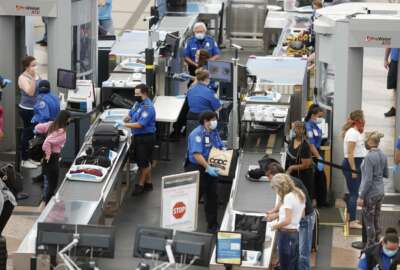The Federal Headlines is a daily compilation of the stories you hear discussed on Federal Drive with Tom Temin.
In today’s Top Federal Headlines, the Defense Department and Veterans Administration tell Congress they’re still working out the bugs at their joint health care facility in Chicago.
- Five years into their experiment in jointly operating a health care facility in Chicago, the of Defense and Veterans Affairs departments have learned they still have some bugs to work out. In a report to Congress, they said the cost of running the facility to serve both veterans and military personnel are running “very high.” Originally, projections had the facility saving the government about $20 million per year. But there’s no going back now. The Navy hospital that used to serve military patients in the area has since been demolished, and disentangling the pay and personnel systems at the integrated facility would be enormously complicated. The two departments recommended against pursuing any other integration of DoD and VA health care facilities until officials “get it right” in Chicago. The Government Accountability Office said much more data is needed to determine how effective the pilot program has been. (GAO)
- The Defense Department said it is having a tough time integrating mobile technology into its mission, largely because every attempt to link it to the Common Access Card (CAC) has been too cumbersome. But the Defense Information Systems Agency’s Purebred program may have found a way to bypass the CAC altogether. Purebred uses an app that is similar to Google Wallet or Apple Pay. It supports encrypted email and can access many — but not all — CAC-enabled Web portals. (Federal News Radio)
- Active-duty service members may get a tax break if a new bill is passed. Reps. Rob Wittman (R-Va.) and Darrell Issa (R-Calif.) aim to ease the tax burden on military families by allowing them to establish one consistent state of residency. Under current law, spouses are forced to establish residency every time they move. The Military Residency Choice Act will allow military spouses to establish the same state of residency as the service member, so that for any future moves, they will retain the same state for tax and voting purposes. (Rep. Rob Wittman)
- President Trump was expected to sign executive actions on immigration soon. First would be a measure to kick-start construction of his proposed wall along the U.S.-Mexico border. The president was reported to be weighing details of a plan to put an minimum four-month halt on all refugee admissions, as well as temporary ban on people coming from some Muslim-majority countries. (Federal News Radio)
- Spend-it-or-lose-it takes on special importance now that President Donald Trump looks to pay for the wall he has promised to build on the Mexican border. Trump is said to be looking initially at budget allocations agencies haven’t yet spent. He’s expecting Congress to appropriate more wall money when it passes a 2017 budget in April. The administration hasn’t given an estimate for what the wall might cost. Published reports say it could reach $10 billion.(AP)
- President Donald Trump’s pick to lead the Small Business Administration has won bipartisan support during her senate confirmation hearing. Linda McMahon, best known as the founder of the major professional wrestling organization WWE, has pledged to be an advocate for small businesses struggling for contracts with the federal government. McMahon said she will also work to address contract bundling at federal agencies, and look at making federal websites easier to navigate. (Federal News Radio)
- Rep. Mick Mulvaney (R-S.C.) told lawmakers he would bring back a data analysis tool to identify waste in government, if confirmed as the next director of the Office of Management and Budget. A his confirmation hearing, Mulvaney said the Program Assessment Rating Tool (PART), first used in President George W. Bush’s administration, would help identify waste, fraud and abuse across the agencies. (Federal News Radio)
- Federal agencies should be more wary of the Office of Management and Budget’s plan to cut the workforce, than President Trump’s short-term hiring freeze. Trump asked OMB and the Office of Personnel Management to come up with a specific plan to reduce the federal workforce through attrition. But experts caution that attrition is often random and does not let agencies pick the positions they want to keep and which ones they want to lose. (Federal News Radio)
- The Trump administration may need to take a different tack when considering budget cuts at the Energy Department. Chinese officials have said they are going to develop an exascale supercomputer by the end of this year. Exascale computing refers to the capability of achieving a billion billion calculations per second — a thousandfold increase over the first petascale computer that came into operation in 2008. Computerworld reports the Chinese deadline speeds up a race in which China is already ahead. That raises the question of Energy Department funding. Trump wants cuts there, but it’s where U.S. supercomputer development takes place. (Computerworld.com)
Copyright
© 2024 Federal News Network. All rights reserved. This website is not intended for users located within the European Economic Area.




